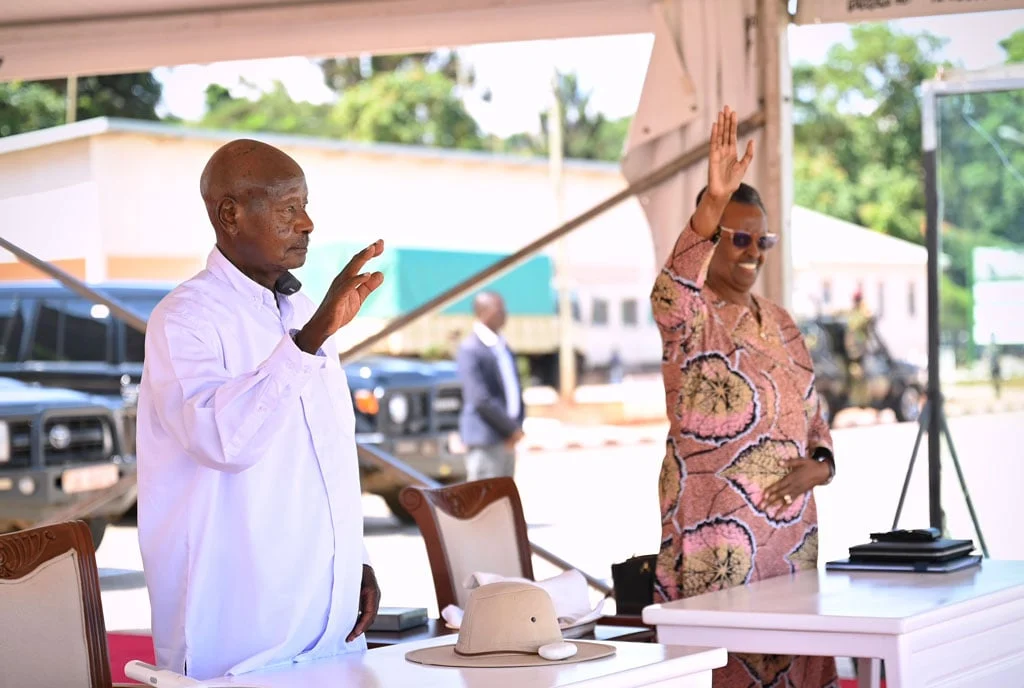Museveni, NRM Leaders Ask for Forgiveness over War Scars, Neglect and Betrayal

In a series of emotionally charged public prayers, President Yoweri Museveni, First Lady Janet Museveni, and senior NRM figures have issued sweeping apologies to several regions, admitting to historical failures, neglect, and corruption.
Framed as spiritual repentance, the prayers carried unmistakable political undertones as Uganda heads toward the 2026 general elections.
At Kololo Independence Grounds, during a national evangelical convention organised by their daughter, Pastor Patience Rwabwogo, the President and First Lady stood side by side and read a joint prayer that marked one of their rarest public confessions.
“We acknowledge that we’re human, have missed you and have made mistakes in one way or the other. Forgive us, oh Lord,” they said solemnly.
“As the top leaders of the Movement, we humbly take responsibility for all the mistakes made by ourselves, our agents and representatives.”
Addressing Buganda directly—a region central to Uganda’s political history but often at odds with the ruling party—the Musevenis acknowledged decades of mistrust and feelings of betrayal.
Janet Museveni, long associated with a message of healing and maternal concern, struck a familiar tone: “We stand here to repent and ask for your forgiveness, especially from the people of Buganda, and the whole country. There has been marked laxity, negligence and lack of diligence... Many grassroots supporters have become angry and often feel neglected or forgotten.”
Though cast as a spiritual act, the confession was deeply political.
The First Couple invoked the memory of their early support in Buganda and called for a revival of that shared commitment.
“The way we came to them in the beginning is the way we’re coming to them again to resurrect our mutual love, respect, commitment and support,” they said.
Their appeal concluded with a national plea: “Lord, restore the favour we had at the beginning. Soften hardened hearts and connect us to the original vision of national unity and transformation.”
The apologies to Buganda form part of a broader series of confessions made by NRM leaders to other regions that have suffered through war, poverty, and perceived marginalisation.
In Acholi, a region devastated by successive conflicts—from Idi Amin’s terror to the chaos of Alice Lakwena and Joseph Kony’s LRA—the prayer recalled mass suffering and broken families.
“People lived in internally displaced people’s camps. Families, clans, and whole communities were greatly disrupted, resulting in the breakdown of the social structure in the sub-region,” the statement read.
While peace had been restored, the leadership admitted that trust had not fully returned.
“Many of our grassroots leaders and people have become disgruntled and angry... We are here to take full responsibility of all the mistakes which were made at various levels. Forgive our failures… Forgive us, we pray.”
Luweero, the symbolic heartland of the bush war that brought Museveni to power, received a particularly poignant confession.
“The people in this area received us and embraced the revolution. They sacrificed their lives, children, security, food, and other resources to liberate this nation,” the statement said. But the NRM leaders admitted they had not upheld their end of the bond.
“There was laxity, negligence and lack of diligence... Therefore many of our grassroots supporters have become disgruntled and angry and often have an erroneous perception that we just used them and forgot them.”
In Eastern Uganda, where ethnic tensions and chronic poverty persist, the prayer carried a similar pattern—acknowledging not only leadership failure but also what the statement described as “the weaknesses and stubbornness of the people themselves, who either deliberately or unknowingly failed or neglected to embrace government programs.”
The apologies are widely seen as part of a national healing initiative—an effort to confront political estrangement before it festers into outright opposition. But reactions have been mixed.
In Luweero, an elderly veteran who lost his sons during the war said: “We appreciate the words, but we want to see action.” In Acholi, a local pastor welcomed the message but urged follow-through: “Don’t let this end in Kololo. Let it reach our roads, our clinics, our youth.”
Political analysts suggest the moment was a calculated attempt to rebuild emotional bridges with disillusioned voter blocs, especially in Buganda, where political allegiance has shifted in recent elections.
But others noted the religious framing allowed the First Couple to own up to failures without facing legal or policy consequences.
Still, the sheer visibility of the gesture—made before thousands—has sparked public reflection.
For now, the prayers echo far beyond the grounds of Kololo or the pulpits of Acholi. Whether the words become deeds will define the legacy of Museveni’s final term—or the twilight of his rule.



0 Comments